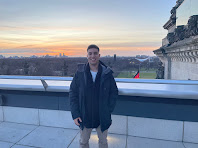Berlin und die "Killer" Ideologien
My anecdote takes first place one week before this trip, when I was visiting Zurich. I took a FlixBus with 2 friends from Freiburg and we noticed that the driver and his assistant were from Italy. When I was doing the passport check, the Italian assistant was surprised by my Chilean passport and since the Spanish and Italian languages are similar, I was able to understand when he told me was coming from a "killer country". At the beginning, I felt confused and was kind of happy he knew about Chile's existence, but then during the trip when I asked him to elaborate, he told me that both of his Italian grandparents escaped to Chile from WWII, settled in Chile, but were assassinated in the Pinochet Dictatorship. Even though it wasn't my fault, I couldn't avoid to feel a little bit ashamed about the situation. In addition, the day I came back to Freiburg I met a Chinese, half-German student who was rooming with one of my IES friends and he told me he knew about the Pinochet Military Junta and how he said, "Chile is like the Germany of South America".
This week, the IES program took us to Berlin for a 5 day eyeopening trip about the culture and history of Germany. I had the amazing opportunity to visit Berlin's main attractions such as the German Bundestag, the Brandenburg Gate, the Holocaust Memorial, the Berliner Fernsehturm, among others. Since the first day I was impressed by the size of the buildings such as the Berlin Hauptbahnhof, and also by the different architecture between modern and post-modern infrastructure.
In my 3 weeks living in Germany, I have noticed the extreme respect and unavoidable resentment towards the "stained past" in German history. While in Berlin, "The Topography of Terror" and the "Hohenschönhausen Memorial" made me understand some common practices and differences within the two dictatorships. Both tyrants manifested the oppression of different ideologies by torturing, interrogating, and convicting individuals for their beliefs as potential "enemies of the state" causing widespread terror among everyone in the region. Whereas one was more concerned about race supremacy, the other one was more concerned about political affiliation and anti-communism. After WWII, Berlin experienced the division into zones based on political ideologies which also became a symbol of the cold war of two colliding political ideologies.
Reflecting with the IES professors, some of whom lived through the separation in Berlin, I came to the conclusion that "Freiheit", is what this dictatorships took from our loved ones, and their control and imposition of will can not be tolerated ever again since it jeopardizes our ability to live freely. I enjoy learning about the past and what others think about what represents us, such as countries or regions. I am grateful to see these historic representations everywhere in Berlin; I hope that I will be back in Berlin soon since "Ich bin ein Berliner" auch.








Comments
Post a Comment